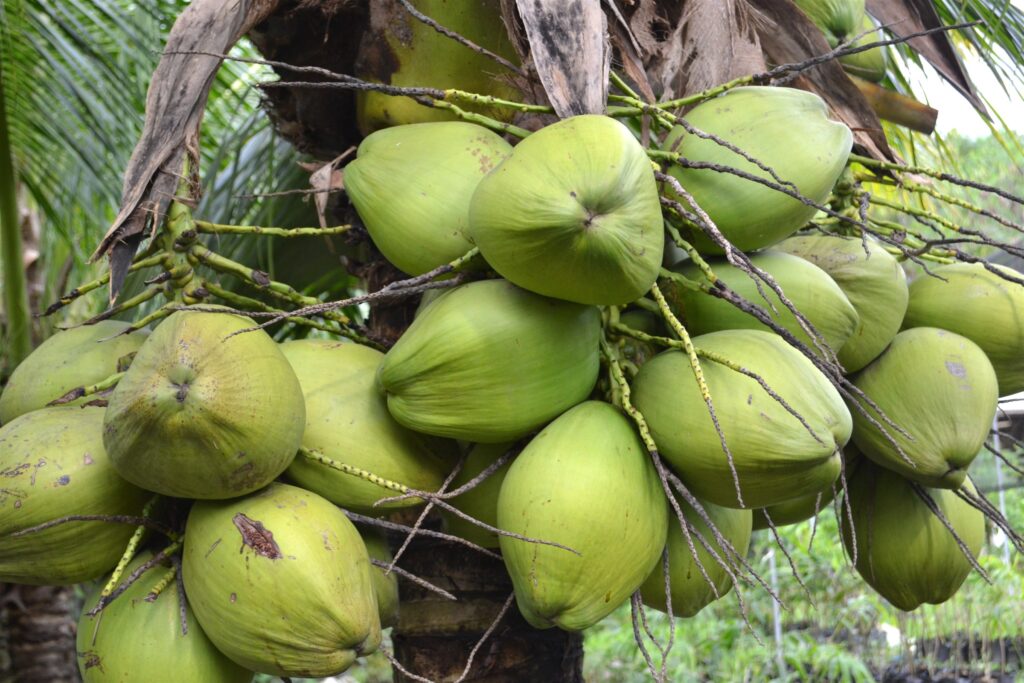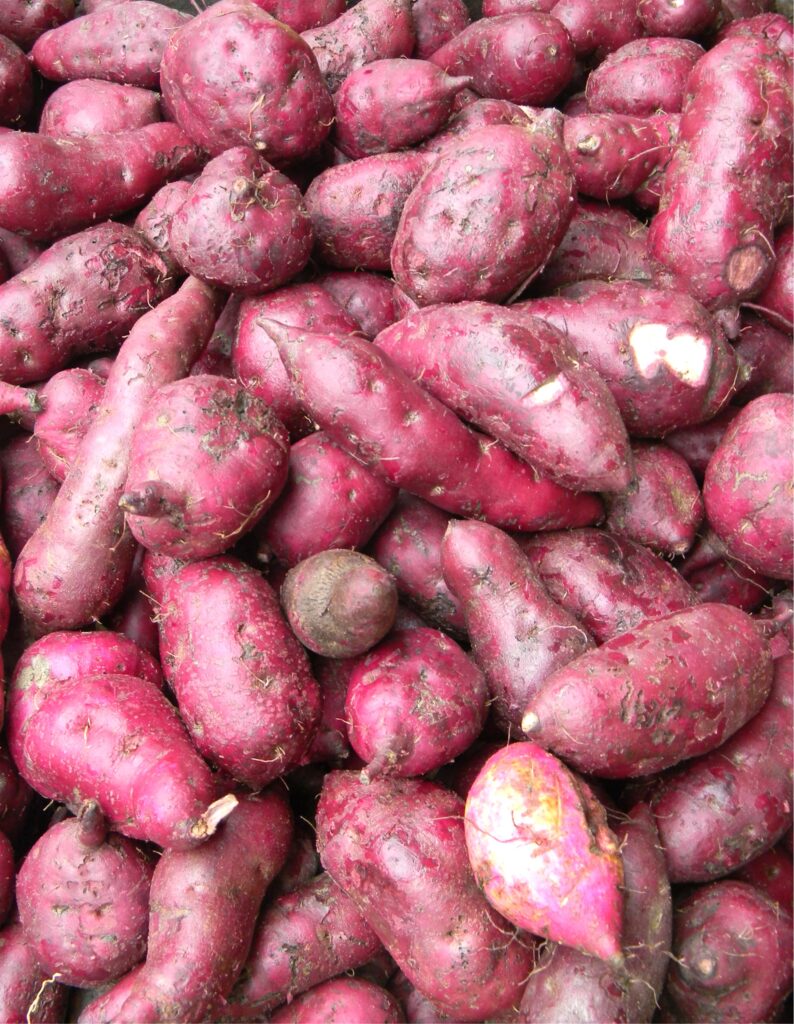Text and Photos by Henrylito D. Tacio
Carrots, coconuts, and sweet potatoes. These are just three of the 49 anti-aging foods that “might add years to your life,” according to Charlotte Hilton Andersen and Jenn Sinrich.
“The evidence in: Choose your food wisely and you can add years to your life,” the two authors wrote in Reader’s Digest. “Our list of anti-aging foods goes way beyond green tea!”
Carrot
Let’s start with carrots. There’s an old Polish saying that goes this way: “If your husband is old and weak you must have him drink the juice from two big carrots and one firm celery.” Irena Chalmers, writing for The Great Food Almanac, seemed to agree; eating a carrot a day, she said, is “like signing a life insurance policy.”
“Unlike most vegetables that carry a high source of one vitamin or another, carrots are concentrated with Vitamin A, beta carotene and fiber, which work together to solve a number of maladies. Whether you consume them cooked, raw or juiced, carrots will provide your body with its beneficial nutrients,” wrote Ed Robinson in “The Health Benefits of Carrots.”
On its anti-aging powers, Andersen and Sinrich quoted Toby Amidor, author of Smart Meal Prep for Beginners. The latter said: “One medium carrot provides 204 percent of the daily recommended amount of vitamin A, an antioxidant vitamin needed to create new and healthy skin cells. Vitamin A also protects your skin from bacteria and viruses.”
There are numerous research studies documenting the cardiovascular benefits of carrots. Some studies have shown that the cardiovascular system needs constant protection from antioxidant damage. This is particularly true of the arteries, which are responsible for carrying highly oxygenated blood.
According to research from Harvard University, people who ate more than six carrots a week are much less likely to suffer a stroke than those who ate only one carrot a month or more.
Everyone knows carrots improve vision, as it provides the highest vitamin A content of all vegetables. Health Online Zine shares this information: “The retina of the eye needs vitamin A to function, lack of vitamin A causes night blindness. Carrots are rich in beta-carotene, a substance which converted into vitamin A in the liver. In the retina, vitamin A is transformed into rhodopsin, a purple pigment that is necessary for night vision.”
Beta-carotene has also been shown to protect against macular degeneration and senile cataracts. A study found that people who eat the most beta-carotene had a 40 percent lower risk of macular degeneration than those who consumed little.
Some studies have found that eating carrots may help lower the risk of breast cancer, lung cancer, and colon cancer. Recently, researchers have isolated a compound called falcarinol in carrots that may be largely responsible for anti-cancer benefits.
Coconut
Now, what about coconut? The website of Coconut Oil Central states: “Coconut oil anti-aging properties can slow down your biological clock, even turn back the hands of time. The King of Oils has a favorable impact on every area that makes you look and feel young or old. It addresses free-radical destruction, believed as one of the leading cases, if not the leading cause, of premature aging.”
“Coconut oil is very healthy,” UK’s Holland and Barrett claims, adding: “Coconut oil is the little black dress of wellbeing – everyone should have some!” Celebrities like Gwyneth Paltrow and Kourtney Kardashian even endorsed it.

Coconut oil’s saturated fat is made up mostly of medium-chain triglycerides (MCTs),” wrote Matthew Kadey in WebMd.com. “Some people say your body handles them differently than the longer-chain fats in liquid vegetable oils, dairy, and fatty meats.”
Coconut oil, studies have shown, contains lauric acid, a medium-chain fatty acid. Pure coconut oil contains about 50% lauric acid. As such, coconut oil contains a healthy type of fat.
“Detailed comparison of the fatty-acid composition shows coconut oil is very different from animal fat,” the article said, adding that studies assuming they are similar are consequently in error, according to Ateneo de Manila University’s Dr. Fabian M. Dayrit.
Some studies have shown that MCT-saturated fat in coconut can boost your HDL (high-density lipoprotein) “good” cholesterol. This makes it less bad for your heart than the saturated fat that comes from animals like cheese and streak or those products containing trans fats.
Dr. Bruce Fife, an American certified nutritionist and doctor of naturopathy medicine disclosed, “Eating coconut oil (and other saturated fats) increases both HDL and the ‘good’ LDL, thus lowering the risk of heart disease. This is one of the reasons populations that eat a lot of coconut oil have the lowest heart-disease rates in the world.”
Sweet potato
Finally, about sweet potatoes, more popularly known among Filipinos as camote. The colorful tubers “deserve a starring role in meals thanks to their life-lengthening properties,” Andersen and Sinrich wrote.
The North Atlantic Human Nutrition Research Center on Aging considered camote as one of the world’s healthiest foods. The reason: it has the highest amounts of vitamin A among the root vegetables category. It is almost fat-free (0.39 grams).
According to the United State Department of Agriculture, for one medium size camote, you get 2.15 grams of protein, 31.56 grams of net carbs, 3.8 grams of dietary fiber, 28.6 milligrams of calcium, 16.9 milligrams of sodium, 265.2 milligrams of potassium, and 29.51 milligrams of vitamin C.
American nutritionists found that camote has “almost twice the recommended daily allowance of vitamin A, 42 percent of the recommendation for vitamin C, and four times the recommended daily allowance for beta carotene.”

A cup of cooked camote (about 200 grams) is better than broccoli and cabbage in vitamins A and C, iron, and calcium content. Because nutrients are anti-inflammatory, they help reduce the severity of asthma, osteoarthritis, and rheumatoid arthritis.
Among root crops, camote has the highest vitamin A content. Eating the yellow- or orange flesh color (directly linked to beta-carotene content) can lead to healthy skin and healthy surface linings of the eyes and the respiratory, urinary, and intestinal tracts. Vitamin A also fights infections very effectively and protects the walls of the arteries and veins against hardening.
Despite the name “sweet,” it may be a beneficial food for diabetics, as preliminary studies showed that camote has the lowest glycemic index among root crops. Research shows that sweet potato stabilizes blood glucose levels and enhances the response to insulin.

